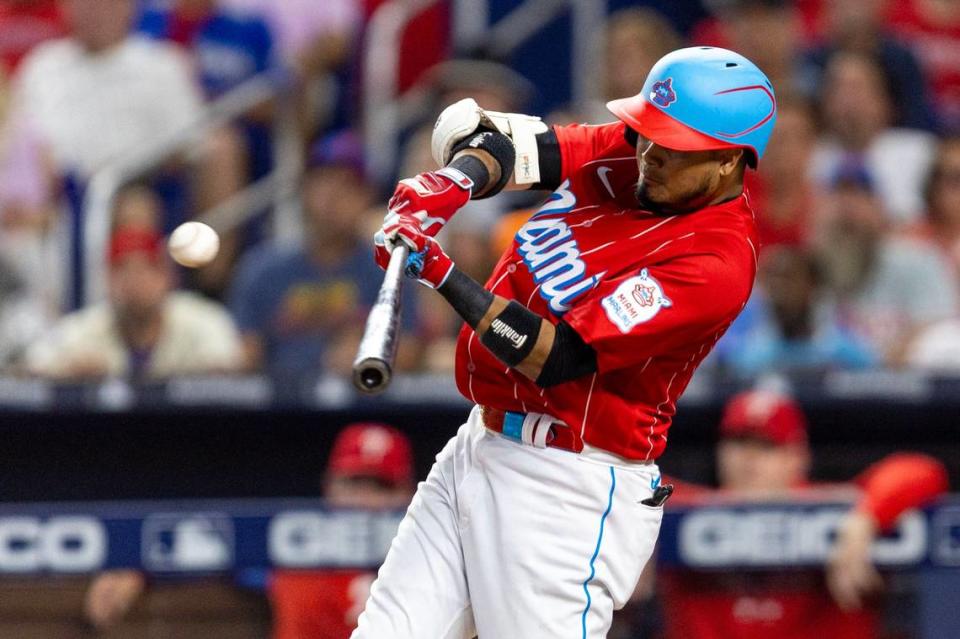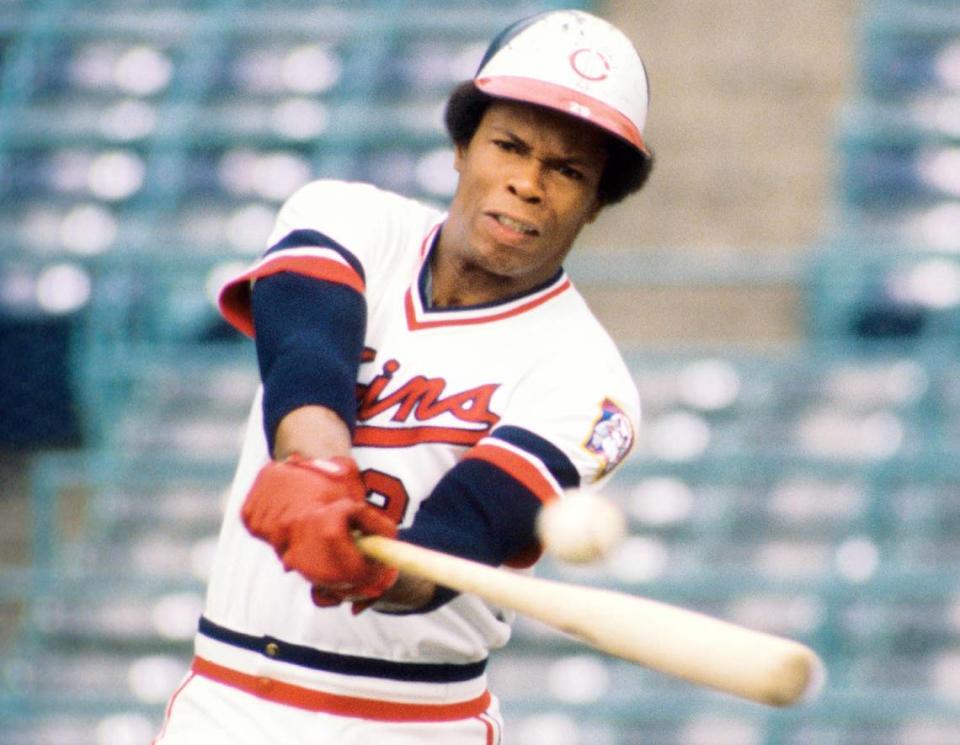Q&A: Rod Carew talks Luis Arraez and the state of hitting in baseball
- Oops!Something went wrong.Please try again later.
- Oops!Something went wrong.Please try again later.
Earlier this season, Miami Marlins second baseman Luis Arraez referred to Rod Carew as being “like my grandfather.” Carew, the seven-time batting champion and National Baseball Hall of Fame member, was there for the early stages of Arraez’s professional baseball career and helped Arraez find his footing as a contact hitter in a day and age of baseball that prioritizes power and slugging at the expense of pure hitting.
Arraez is now in his fifth MLB season and first with the Marlins after being acquired from the Minnesota Twins.
He’s chasing history, too, looking to potentially become the first player since Ted Williams in 1941 to finish a season with a .400 batting average.
Carew at one point was in Arraez’s position. He came close to the .400 average milestone in 1977 before ultimately finishing the year hitting .388.
In a recent phone interview, Carew spoke with the Miami Herald about Arraez’s performance, his memories of working with Arraez and the state of hitting in baseball.
The interview has been edited slightly for length and clarity.
What do you remember about your first interactions with Arraez?
“I think the key thing with him was sitting and talking to him and seeing where his head was at as far as hitting goes. He wanted to use the whole field to hit and wasn’t trying to hit the ball out of the ballpark because when he started trying to do that, he ran into trouble. It was nice to see a young kid that wanted to learn and was disciplined to learn because with everything I said, he would ask me questions about why or how and things like that. I just told him reasons why. I told him, ‘You’re a good hitter and if you want to improve and continue to improve, you’ve got to do these things.’ The main thing that I wanted him to try and do was track the ball all the way out of the pitcher’s hand because a lot of hitters don’t do that anymore. Everybody’s trying to swing up and hit home runs. And Luis was, at times he would get away from that and I would chew him out. And then he’d come and sit next to me and we’d start talking. I wouldn’t pay attention to him at first and then eventually I would because I wanted him to maintain that discipline that we talked about. I would tell him, ‘You’re not a home run hitter. Don’t worry about hitting home runs. Worry about being consistent at the plate, that they can count on you in any situation when you’re up there.’”

What’s it like to see a guy like Arraez getting rewarded for that style of hitting when so much focus is on power and home runs?
“It’s great because Tony Oliva and I would attack him in spring training when we saw him trying to swing up on the ball. I’d always pull him aside and talk to him and quiet him down and tell him not to be in such a rush to get to the ball. Track the ball and then the ball would dictate to you where you’re supposed to hit it. He caught on real quick because he saw movement, and he knows that pitches that are moving away from him, he can’t pull it or he’s gonna roll over and hit a ground ball. We stress to him that with fly balls, there aren’t any base hits in the air with fly balls. Every now and then, a guy might lose the ball in the sun, but if we could just stay on hitting ground balls and line drives to all fields, use the left field foul line to the right field foul line and vice versa, that will keep you on track and keep you on the ball and you’ll have success that way. They’re spoiling baseball today because young hitters have no clue. They’re all up there guessing. To hit, you have to see the ball and see what it’s doing and then you have that much time to react to it. That’s what Luis does so well. He uses his hands. If you ever see him after a pitch and he kind of jumps a little bit, that’s because he’s tracking the ball all the way and he knows what that pitch did and that he didn’t have to swing at it. He’s just a smart kid. I’ve chewed him out a few times, and I get that little smirk from him, but he’s a good kid. He wants to keep improving, and I’m glad he’s doing well.”
Did you see .400 potential from him?
“With him, I didn’t see .400 right away. I saw him hitting for a high average and I could tell that every now and then he wanted to get away from it and show a little pop and I would have to stay on him. He’d look at me and he’ll smile and stuff, but I can truly tell you that I was on him all the time with positivity. And he always responded that way with me, too. But the only guy that I thought had a chance to probably get to the .400 mark was Ichiro [Suzuki] because of what he did, played and how he did it. But now Luis really has me concentrating on him more, trying to see his games and making sure that he doesn’t get a phone call from me about hitting fly balls. I tried to pick up on him as much as I can, and he’s been doing the things that Tony and I talked to him about.”
How often are you in touch with him?
“Not that often, but if I see something, if I’m watching a game and I see something, I would call him right away. There have been a couple of spots this year that I’ve seen, and I haven’t called him because I was waiting to see if he was going to correct it. And he did. So, you know, I haven’t been able to call and talk to him about it yet. Hopefully, I don’t have to.”

What does it take for a hitter to truly have this type of success?
“Hitters like us don’t fail like other hitters. The key thing is he knows himself. He knows what he’s trying to do. In today’s game, a lot of kids don’t know themselves. They don’t know what kind of hitters they are, and the more that baseball allows them to keep trying to to hit home runs, the worse a lot of them are going to be up there. They’re not going to learn anything about hitting. For a guy that can hit five or six home runs a year, why is he up there trying to hit home runs? They give you foul line to foul line to hit, to use the whole field. That’s what the game is supposed to be based on, but guys aren’t doing that today. That’s why you see a lot of strikeouts and I’m disgusted with the strikeouts and disgusted that they think that walking back to the bench is fun after striking out three or four times a game. That’s no fun at all for hitters. Either they’re going to have to change and allow hitters to be the type of hitters that they were [back in the day] or not. If you don’t, then it’s going to keep getting worse.”
I’m curious then, from your perspective, what do you think it would take for hitters to get back to that type of approach?
“They should go back to using the whole field. They should go back to disciplining the young people in today’s game to think about that. Sure, you’ve got guys that are going to hit home runs, but not everybody can swing up and hit the ball out of the ballpark. I would advise these kids today about the late Hank Aaron. I don’t think you ever saw him swinging up on the ball. He did it the right way. Some of these kids should take a look at that and see those swings. Whenever he did hit a home run, he didn’t uppercut the pitches. I don’t know. They’re going to keep hurting the kids with these analytics. I think that’s a big part of it. They say ‘Oh, if you don’t hit home runs, you’re not gonna make any money’ and stuff like that. I heard that before. I wasn’t going to un-discipline my way of thinking and my way of hitting to please the masses. I was looking for consistency. That’s what the Twins wanted me to do when they brought me up. That’s what I tried to do throughout my career.”
Do you think the attention Arraez is getting could help spark a change?
“I don’t think so because kids don’t want to listen anymore. They don’t want to hear from the veteran players like myself or guys that have had success. They have a one-track mind. Once they get into the game, or even in high school, everything is hitting home runs, not that they’re going to make themselves a good hitting. It’s how many am I going to hit this year? Once that thought gets into your thinking, then you’re going to start fighting a losing battle.”

